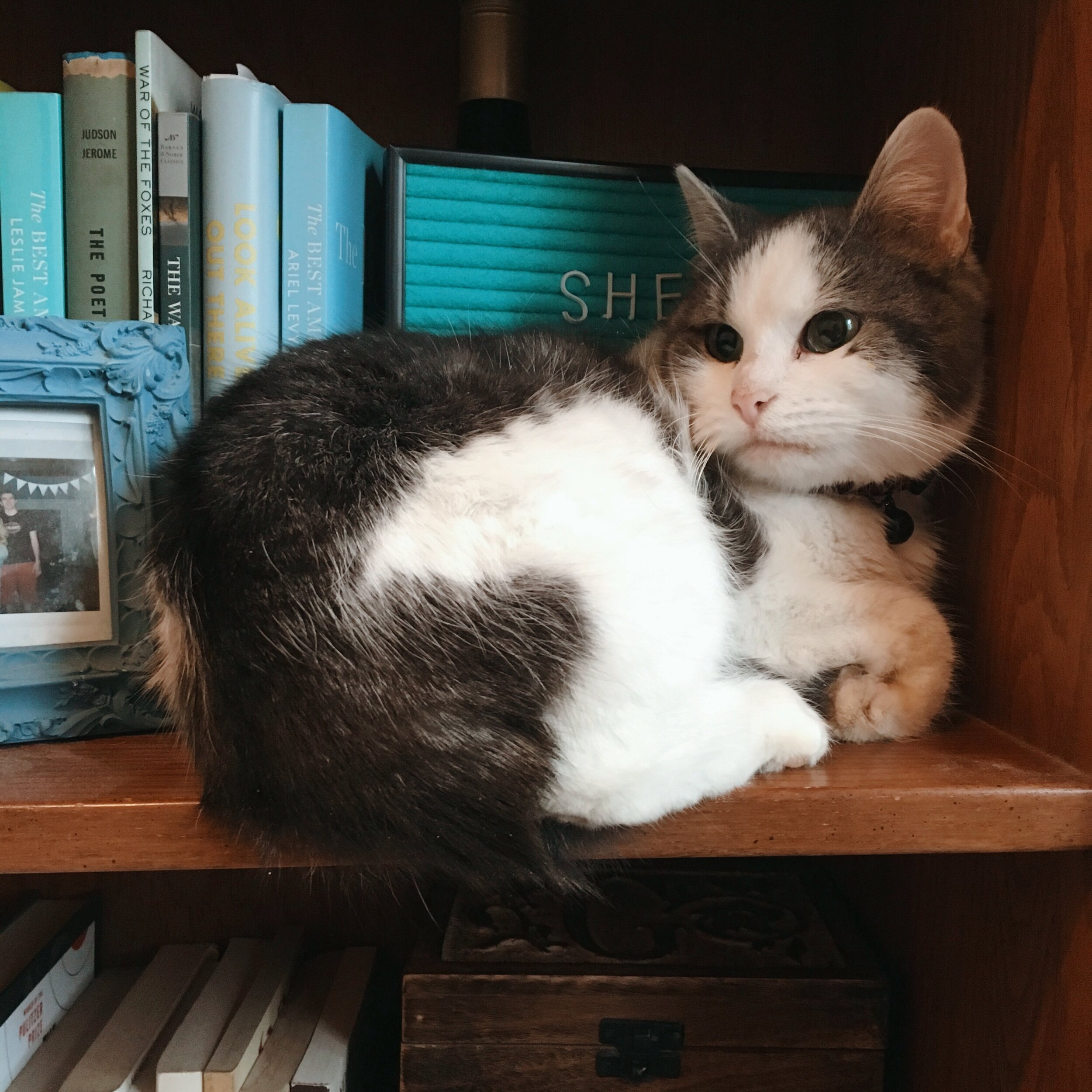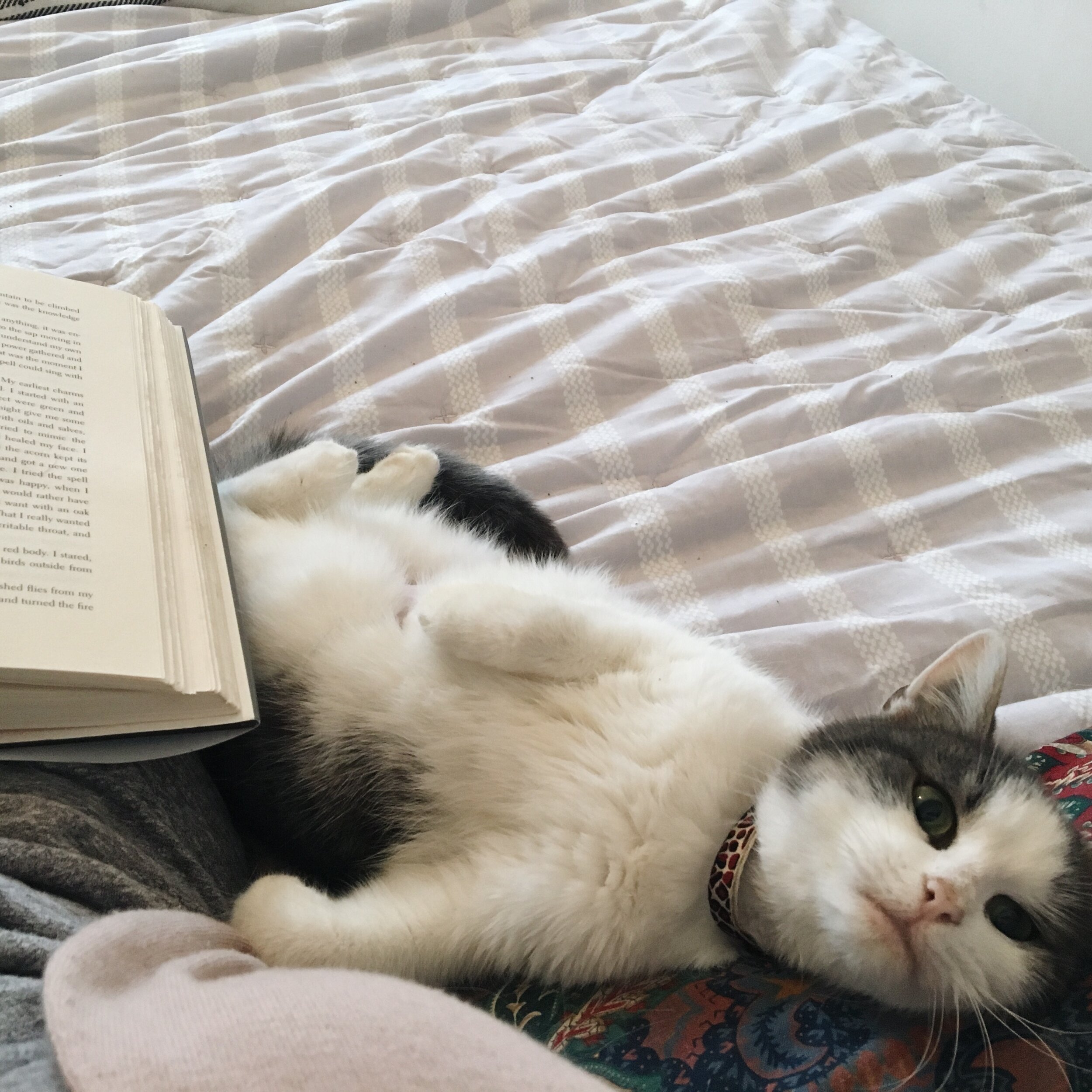are you there, sheryl sandberg? it's me, grace
Since I started living on my own, I’ve had a phobia of cooking. I’d eye chicken breast nervously at the store, scroll past recipes on Pinterest with reckless abandon. But there’s only so much one can do with mixed vegetables/broccoli florets and pasta, or on occasion, Mrs. T’s frozen pierogies. The only things I can make from scratch are banana bread, and ham and vegetable soup. Besides that, my culinary talents rarely extend past scrambled eggs and avocado toast. When I met my boyfriend’s parents, his dad asked if I could cook. Before I could open my mouth to speak, my boyfriend said “Nope.” He bought me a slow cooker for my birthday (and an accompanying cookbook), which I have yet to use—a sore spot for him, no doubt. But I’m working on it!
On Thursday night, he came over after work and I had dinner waiting for him: my soup (sans ham), and seared chicken thighs. I felt like I should have been wearing a dress with a feminine printed apron, and full hair and makeup. Think Julia Child a la Meryl Streep. When Sheryl Sandberg wrote Lean In: Women, Work, and the Will to Lead, she probably didn’t mean “lean in” to domestic bliss.
Speaking of domestic bliss, I gave into temptation and adopted a cat. And I have zero regrets. My Margot is a year old, and was part of a 100+ cat rescue from a hoarder’s house in the middle of January. I adopted her from the same shelter Mister came from. I’ll spare you from my cringe-worthy gushing, but my God she is so sweet. A queen without a king is historically better. But a writer without a cat? Historically lonely.
Besides anxiously awaiting a response from a summer writing program I applied to, and tracking my tax return refund status, I’ve been trying my best not to worry about the Big Thing (finding stable employment before Sallie Mae starts to kick in).
This is what no one tells you after you graduate:
Time is nothing, time is everything. You’re young but not young enough, wiser on paper but aimless off the page. Writing a cover letter is about as self-congratulatory as award shows. Your To Be Read (TBR) pile of books grows and is often left unattended. You get scared of doing the things that used to make you happy. Getting out of bed and getting dressed is sometimes the most you can do. On the bus you will see an older woman board with a reusable shopping bag—the big, colorful flowers printed on it will distract you from wondering about your fate. Some days you will feel happy, and other times pathetic. You will go out with your longtime friend who is facing the same dilemma. You will sit across from him at a small table, picking at what’s left of your fries. Amidst the noisy bar chatter and music, you hear him say “It will get better for us.” And you believe him. Because you have to. Because you want to. Because time is nothing, and time is everything when you’re 23. The sun is setting on what we thought would be true, what we thought would be granted to us. Once you’re out, college will feel like the longest and shortest time of your life.
Here is what you already know:
Time is compressed when you’re waiting for the bus to go home. The world can and will go on without you. You never liked the Salvador Dali painting of the melting clock. You want, and you ache. You look at the Instagram accounts of publishing houses and their imprints. Glossy, colorful covers held in front of bookshelves by the manicured hands of editorial assistants. It is doubtful whether or not you will have those hands, or stand in an office like that hundreds of miles away from home. You paint your own nails but the color chips after four days tops, from the dishwater at your job that pays the rent. There is always some kind of ink on the side of your pinky finger. You can’t write for a grade now—it all has to come from the heart. Smaller things are exciting now—grocery shopping and going to the library. You’re not unhappy, but you’re restless. You know how to find and create small extravagances. In fact, they’ll never run out.
The month of January 2020 alone felt like an entire year within itself. With celebrity deaths, the threat of war, and a virus outbreak— the world, or rather, the virtual one, has been frantic. The sudden death of Kobe Bryant extracted empathy from even the most unlikely of sources, including people who aren’t exactly passionate about the NBA (i.e. myself). It was a grim reminder that there is no amount of money or power in the world that can protect you from your own mortality. Truly no one is untouchable. Before the death of Kobe, the world lost an important voice from the literary world, Elizabeth Wurtzel, who came to fame in 1994 after the publication of her memoir, Prozac Nation (which was later turned into a cult classic film in 2001 starring Christina Ricci).
At the time of Wurtzel’s death in early January, my knowledge of Prozac Nation came from overly-edited black and white gifs of Christina Ricci smoking a cigarette that was widely circulated throughout the moody archives of Tumblr back in 2012. Funny that I could read The Bell Jar in middle school yet it never occurred to me to read any of Wurtzel’s work (then again, most of the things I read in middle school were above my maturity level—at the charter school I attended in New Jersey during those years, my specific class immersed themselves in pop culture that was beyond their understanding in order to seem older).
The day she died, Twitter was holding a collective funeral, with colleagues and writers posting links to some of her essays, and recalling interactions with her. I clicked on a link that led me to an essay she wrote in 2013 for The Cut, called “Elizabeth Wurtzel on her One-Night Stand of a Life.” I read it over and over again, taking in its rawness and complexity, each time a punch in the gut.
Later that night, I read more about Wurtzel and realized that she was no stranger to controversy and criticism. Her essays have been described as “self-involved” and “incoherent",” mostly by other contemporary women writers, which I found most interesting, and also upsetting. Wurtzel wanted the world to know she was messy. What’s so wrong with that? She’s not Caroline Calloway. I suppose that even our own self-awareness can stunningly turn against us when we least expect it.
This post was, I realize now, about several different things. But I guess the point I’m getting across is that I care most about telling the truth about my life, even if it doesn’t make my life look pretty or Instagrammable. Post-grad life does not look such a way, at least not immediately. The truth about my life, for the moment anyway, is that it’s been a rollercoaster full of ups and downs. I’m waiting to reach more stable ground, and I’m hoping I get there soon.


